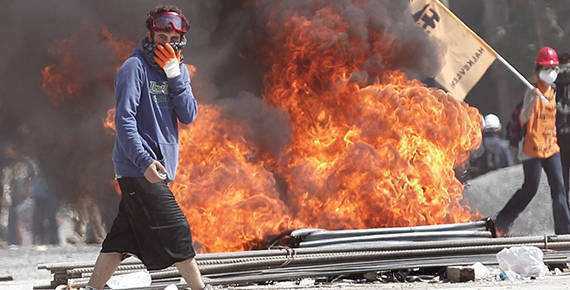Taksim Gezi Park protests, which began as peaceful sit-ins on May 28 against the government plans to redesign the Taksim square fell over time hostage to the agendas and objectives of marginal leftist groups after disproportionate use of police force. In the meantime, claim of government interference with the lives of certain sections of society became another reason behind the protests. A survey done by Andy-Ar Center for Social Research indicated that the majority of protestors were out on the streets to defend their freedoms restricted by the government.
Academics, intellectuals and columnists who supported the protests and agree with claims of authoritarian tendencies in the AK Party government argued that protestors defend post-industrial values and that they are against the Prime Minister’s encouragement of consuming the regular bread less, three children, and regulation of places where people may smoke and consume alcohol as well as hours alcohol can be sold. As eminent a sociologist as Nilüfer Göle went as far as to claim that ‘some of the morality themes that the government speaks of bear traces not of conservative democracy but of religious fanaticism.’ What we are faced with here is in a way the return of ‘Islamization of Turkey’ debate that one would think we left in 2009-2010. Those who expected the government to prove that Turkey’s traditionally western-oriented foreign policy did not lose that axis a few years ago, now demand Turkey’s conservative democratic government to make an oath of liberal democracy. This odd expectation from the government underlines the efforts of those intellectuals in Turkey, whose conception of individual, society, rights and freedoms do not have a mass support, to steer the government in their direction and form an intellectual hegemony around liberal democracy.
Turkey’s liberals, mostly intellectuals, some elites and academics, did not put an effort to form political parties and seek electoral stamp on the validity of their values and truths. When they did form Liberal Democratic Parties and competed in elections, they got not more than %1 of the votes. Liberals, encouraged by the West’ singlehanded promotion of liberal democracy as the only valid form of democracy, rather preferred to turn their values into real life-policies over the pressure they exert over other political parties with larger electoral appeal. The relationship liberals established with the AK Party since 2002 exemplify their purely instrumental approach. As long as the AK Party showed enough courage and bravado to realize the European Union reforms, tackle the military-bureaucratic tutelage and make genuine attempts so solve the Kurdish issue, it was almost an ideal political party for the liberals. Liberals would have no problem with the AK Party government that left its ‘conservative democratic’ identity in the pages of its election propaganda and kept acting only like democrats. In other words, Turkey’s conservative democrats are now demanded to not act like conservatives in the upcoming years of construction of ‘New Turkey.’ This is why in reaction to the government regulations of alcohol sale, encouragement of learning and teaching of religion, the Prime Minister’ wish to raise pious generations in Turkey and his characterization of abortion as ‘murder’, we now hear from the liberals cries of “postmodern authoritarianism” and “interventionist puritanism.” As Al-Jazeera English says, “Turkish PM was once championed for democratic reforms but critics now accuse him of losing touch.” However, these accusations of authoritarianism and lifestyle intervention do not make any sense. As Yalçın Akdoğan, an advisor to the Prime Minister, says, “we are prevented from designing policies over values. We are told to make only economic investments. When it comes to cultural values, troubles begin. But we have an electoral declaration and our



